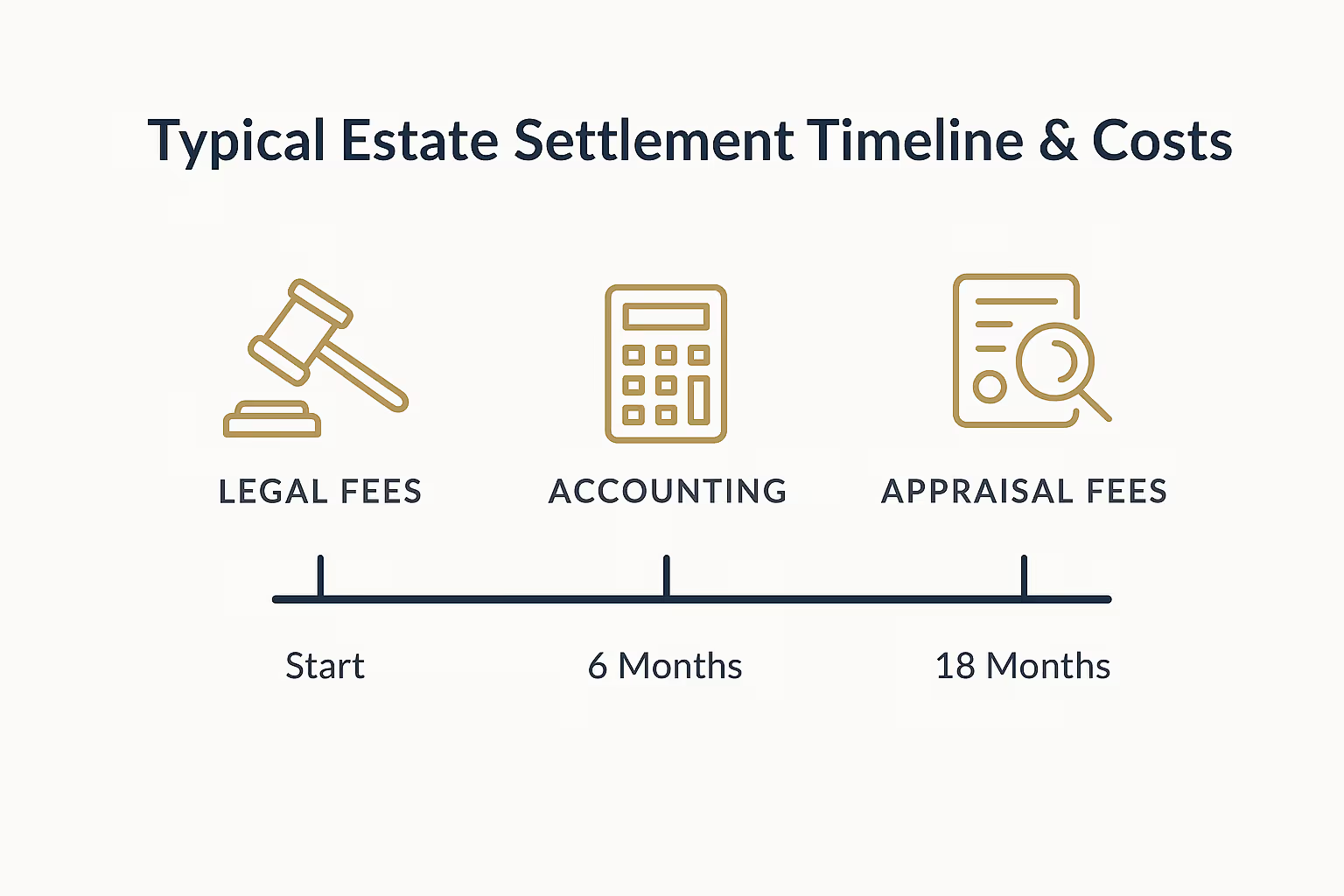






As the executor of a loved one’s estate, you are tasked with significant legal and financial duties. From managing assets to satisfying the IRS, your responsibilities are complex and carry personal liability. The most critical step in this process is obtaining accurate, professional appraisals.These valuations form the legal and financial foundation for the entire settlement, ensuring tax compliance, fair distributions, and your own protection. This guide explains when and why you need them and how these documented valuations safeguard the estate.
Your duties as an executor begin upon accepting the role, and several time-sensitive actions must be completed within the first month. Missing these deadlines can expose you to personal liability and complicate the settlement process.
First, secure your legal authority. File the original will with the probate court, which many states require within 10 days of death. You will also need to obtain multiple certified copies of the death certificate and apply for Letters of Administration or Letters Testamentary. These documents legally empower you to act on behalf of the estate.
Next, establish the estate’s financial identity by obtaining a federal Employer Identification Number (EIN) from the IRS website. This number is required to open a dedicated estate bank account to keep all estate funds separate from your personal finances. Begin securing and inventorying all assets by taking physical control of valuable items, ensuring properties and vehicles remain insured, and notifying all financial institutions of the death. It’s also wise to change the locks on any real estate to protect the property.

The estate inventory is a formal legal document, not just a simple list. It must detail every asset the decedent owned at the time of death, valued at its fair market value as of that specific date. This is where professional appraisers are indispensable, as they provide the documented, defensible valuations required by courts and the IRS. For more guidance, learn about the requirements for a proper personal inventory. For more specific guidance on this core duty, read about appraisals for estate inventory.
Key Concept: Fair Market Value. Fair market value is the price a willing buyer would pay a willing seller when both parties have reasonable knowledge of the facts and neither is under pressure to act. This is the standard the IRS and probate courts use for valuation.
Your inventory must include complete descriptions for each asset. For real estate, this means the full legal description, not just the address. For vehicles, include the make, model, year, condition, and mileage. For financial accounts, you’ll need exact account numbers and statements dated as close to the date of death as possible. This includes valuing assets like a 401k at fair market value.
Significant personal property requires formal appraisals, especially for items that may have appreciated, such as fine art, antiques, jewelry, collectibles, and firearms. Guessing at values or using old purchase prices is not legally sufficient and can lead to penalties or beneficiary disputes. If you have fine art, you will need an appraisal for fair market value of artwork.
As an executor, you have a fiduciary duty to act in the best interests of the beneficiaries. This requires meticulous record-keeping and a clear understanding of your legal obligations to avoid common mistakes that lead to personal liability.
You are responsible for gathering critical documents, including the original will, financial records, insurance policies, and past tax returns. You must also understand the estate’s tax obligations, including the decedent’s final income tax return and any estate income tax returns. Missing these deadlines can make you personally liable for penalties. The use of expert valuations in legal and financial matters also helps protect you in legal proceedings. Furthermore, accurate appraisals are vital for managing the complex requirements of estate taxes.
Additionally, you must follow strict creditor notification procedures. Failure to do so can leave the estate—and you—vulnerable to claims indefinitely. Professional appraisals protect you from liability by providing court-acceptable proof of asset values, demonstrating that you acted responsibly if a beneficiary ever questions your decisions.
Professional appraisals serve multiple vital functions in estate settlement. You must obtain them for a wide range of assets, including all real estate, business interests, fine art, antiques, jewelry, and any other unique personal property with potential for appreciation. This includes obtaining a valuation for a retail business for probate, if the decedent owned one.
Different appraisal purposes require different reports. A date-of-death appraisal establishes the value for tax reporting and must be performed by an IRS-qualified appraiser. If real estate is involved, you should understand the process of obtaining a residential real estate appraisal. You can learn more about appraiser qualifications on our blog. An IRS-qualified appraiser holds credentials from a recognized organization like the American Society of Appraisers (ASA) or the International Society of Appraisers (ISA).
Important Note: USPAP Compliance is a Must. All formal appraisals must comply with the Uniform Standards of Professional Appraisal Practice (USPAP). USPAP-compliant reports are the gold standard for reliability and are trusted by courts, tax authorities, and financial institutions.
When estate assets must be sold, you must follow legal probate sale requirements to meet your fiduciary duties. For real estate, this often involves a court-supervised process that protects you from beneficiary claims that you sold an asset for too little. Professional appraisals are crucial here, as they establish a baseline value for the court and prove that any offer represents fair market value. For real estate, this often means obtaining a fair market value appraisal.
For assets being distributed directly to beneficiaries, appraisals ensure fairness. If one heir receives a property and another receives a stock portfolio, accurate valuations are the only way to prove the distributions are equitable and prevent disputes. This process is fully detailed in our guide on appraisals for trust and estate administration.
The most damaging mistakes in estate settlement often come from rushing the process or handling complex valuations without expert help. Key errors to avoid include distributing assets before all debts and taxes are paid, failing to get court approval for major sales, and using beneficiary estimates instead of professional appraisals.
Executor Warning: Personal Liability is Real. One of the most critical errors is distributing assets to beneficiaries before all estate debts, expenses, and taxes have been paid. If you do this, you can be held personally liable for those unpaid obligations.
Family dynamics can be challenging, so maintain transparent communication with all beneficiaries. Professional appraisals are a powerful tool for preventing family disputes, as they provide objective, third-party valuations that remove emotion from the discussion.

A typical estate settlement takes 6 to 18 months and can cost 5-10% of the estate’s total value. While you should budget for legal and accounting services, professional appraisals are one of the best investments you can make. When you consider that IRS penalties for incorrect valuations can be as high as 40% of the tax owed, the cost of a defensible appraisal—with transparent pricing—is minimal in comparison.
Q: Do I need an appraisal for everything in the estate?
A: No. You need professional appraisals for unique or high-value assets like real estate, business interests, fine art, and collectibles. Standard household goods and simple bank accounts do not typically require a formal appraisal.
Q: Can I use online valuation tools instead of a professional appraiser?
A: No. Online estimates and automated tools do not meet the legal or technical standards required by the IRS or probate courts. Only a USPAP-compliant report from a qualified appraiser is legally defensible.
Q: How do I find an IRS-qualified appraiser?
A: Look for appraisers with credentials from organizations like the ASA or ISA who explicitly state they meet IRS requirements. They should be able to properly prepare and sign tax forms like Form 8283, a topic we cover on our blog.
Q: Can a family member appraise estate assets?
A: No. Family members have an inherent conflict of interest and cannot provide a qualified appraisal for legal or tax purposes. You must use an independent, professional appraiser.
Successful estate settlement hinges on a systematic process grounded in professional valuations, transparent communication, and meticulous compliance. By securing your legal authority, identifying assets that need appraisal early, and working with qualified professionals, you can fulfill your duties with confidence.
Ready to ensure your estate settlement is built on a solid foundation? Our USPAP-compliant appraisals are conducted by credentialed, IRS-qualified professionals who understand the demands of estate settlement. You can request an appraisal directly or contact us to discuss your specific needs and get the defensible valuations you need for court filings, tax returns, and fair beneficiary distributions. Your responsibilities are challenging enough—let our experts handle the complex valuations that protect you and the estate.




